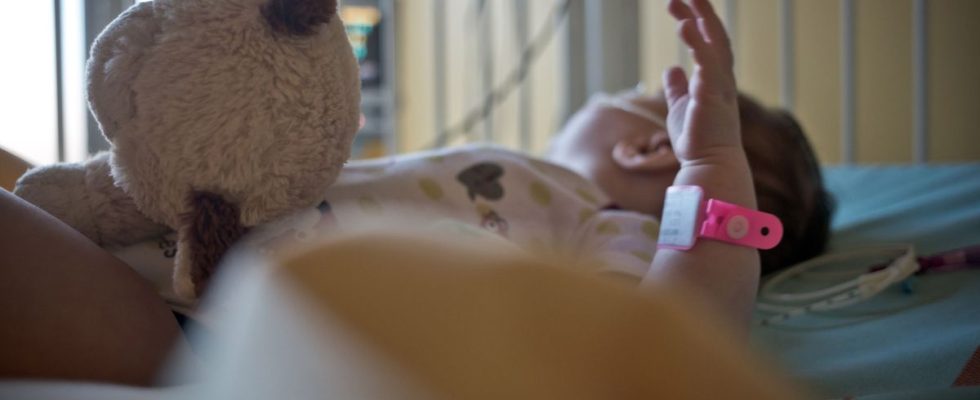No need to go around pharmacies with your Beyfortus prescription. Less than three months after its launch, this preventive treatment for respiratory syncytial virus (RSV), the main cause of bronchiolitis in toddlers, is nowhere to be found, a victim of its success. No longer a pharmacy has any in its drawers, while the epidemic continues to progress throughout France.
Touted by the Minister of Health Aurélien Rousseau as “a major breakthrough”, Beyfortus was acclaimed by young parents, many of whom wanted to protect their babies from bronchiolitis. But will new doses be available soon? And is this prophylactic treatment effective?
“A crazy craze”
Generally not serious, bronchiolitis nevertheless causes breathing difficulties in babies and leads to a number of trips to the emergency room and hospitalizations each year. Last year, it was the cause of an unprecedented epidemic in more than ten years, leading tens of thousands of infants – and worried parents – to hospital. And she’s already back this year. “Within our group of pediatric infectious disease specialists, we carry out RSV, flu and Covid-19 screening tests, and RSV is extremely present currently, at relatively high rates,” confirms Dr. Sylvie Hubinois, pediatrician and former president of the French Association of Ambulatory Pediatrics (AFPA). According to the latest figures from Public Health France, twelve regions are in the epidemic phase and Corsica is in the pre-epidemic phase.
Dr Hubinois observes every year, “bronchiolitis extremely frightens parents, so when Beyfortus was put on the market on September 15, its launch aroused great enthusiasm. However, when it comes to a new vaccine, it is generally difficult to convince them, but Beyfortus, which is not a vaccine but a preventive treatment which consists of a single injection of antibodies, all parents wanted it. »
Initially, the government ordered 200,000 doses of nirsevimab, or Beyfortus, developed and marketed jointly by Sanofi and AstraZeneca: 145,000 doses of 50 mg and 55,000 doses of 100 mg. “But the enthusiasm was such that within a few days, the treatment was no longer available,” says Dr. Hubinois. As a result, the Directorate General of Health (DGS) adapted its strategy and since September 26, “doses of nirsevimab 50 mg, suitable for children weighing less than 5 kg”, have been “reserved for maternity wards”. On September 29, “deliveries of 100 mg doses to pharmacies in mainland France for infants weighing 5 kg and over” were “temporarily interrupted”.
A secure stock but no new doses
In practice, “I was only able to do one injection of Beyfortus out of the numerous prescriptions I issued, and we quickly had to stop prescribing it,” laments Dr. Hubinois. I have received feedback from parents who were unable to find it despite the order. The pharmacists explained to them that it was only available in maternity wards. »
Faced with this situation, the Minister of Health, Aurélien Rousseau, announced at the end of November the order for “50,000 new additional doses” from Sanofi to “last through the winter season in maternity wards”. In detail, “30,000 doses of 50 mg will be delivered to maternity wards. And 20,000 doses of 100 mg are intended to cover orders placed in September in pharmacies which had not been honored, we indicate to 20 minutes on the Sanofi side. Our teams have reconnected with the pharmacists concerned to confirm orders with a view to delivering the doses, so the process is ongoing. »
Pierre-Olivier Variot, president of the Union of Community Pharmacists’ Unions (USPO), “placed an order before closing, but I’m not sure it will be fulfilled, and at this time, I don’t know if others have received theirs, we haven’t had any news “. For its part, Sanofi assures, “the doses have already started to be delivered and all orders that had previously been placed by pharmacists will be honored”. On the other hand, as for the possibility of placing new orders for this season, “this seems very unlikely to me,” says Pierre-Olivier Variot. The next ones will in my opinion be for next year. » And the pharmacist is right. “We will not be able to go beyond 50,000 additional doses,” Sanofi confirms. Beyfortus is a treatment based on monoclonal antibodies and its production is more complex and requires more time than for a vaccine. »
An effectiveness still to be demonstrated
But if Beyfortus has been so popular that it has become a victim of its success, what about the effectiveness of this treatment? Last September, the High Authority of Health (HAS), the body responsible for evaluating new treatments, only mentioned “minor” progress for Beyfortus in terms of “medical benefit rendered”. But in mid-November, Aurélien Rousseau estimated that Beyfortus was already proving its worth in the hospitalization figures, even if pediatricians were more measured, deeming such conclusions too early.
For the moment, visits to the emergency room for bronchiolitis are certainly less frequent than last year, but the change is not significant compared to previous seasons. On the other hand, these passages seem to lead less often to hospitalizations, particularly in intensive care units for the most serious cases. “The goal of Beyfortus is not to prevent all RSV infections, but to reduce the number of serious forms,” recalls Dr. Hubinois. But if the first feedback from our hospital colleagues seems positive, for the moment, it is too early to judge its effectiveness, we will have to wait until the end of the season to find out.” The real-life evaluation results of this treatment should therefore be available in the coming weeks.
And since there will not be Beyfortus for everyone, “it is important to remember the importance of barrier measures: hand hygiene, ventilation of the home and wearing a mask if parents are sick,” she continues. And as the holidays approach, babies should not be passed from arm to arm during family gatherings, especially if there are children or people with coughs or colds, because adults are also carriers of RSV and can transmit it. »

